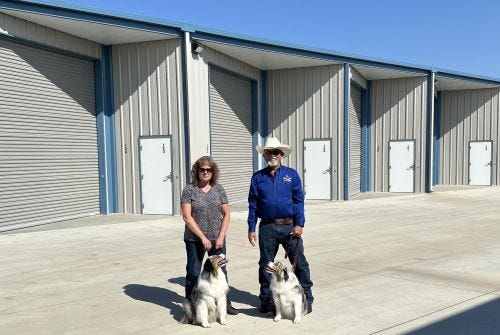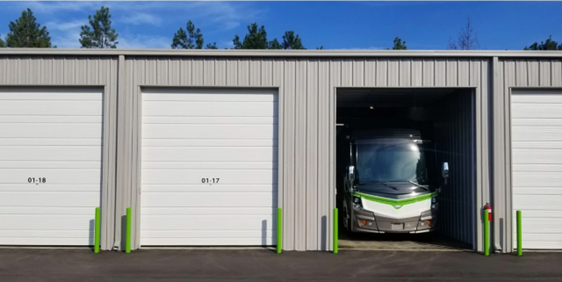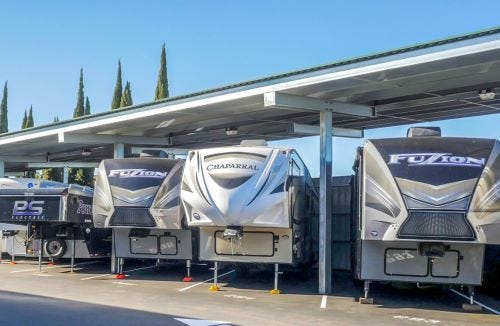Shooting for the Stars in Boat/RV Storage: Advice for Building a Class-A Facility
If you’re thinking about developing a dedicated boat/RV-storage facility or adding vehicle-storage units to a traditional self-storage site, you have many options in terms of construction type, quality and amenities. However, a class-A site complete with all the bells and whistles will provide the best return on investment. Find out why and what it takes to build one.

Twenty-plus years ago, Larry Keller built his first self-storage facility, adding in monster-size units he believed would be a dream come true for owners of recreational vehicles. He was wrong. “People didn’t have enough money to store motorhomes back then,” he says.
It could’ve been a very costly mistake had Keller not managed to rent those units for the storage of large construction equipment. He managed to make good and eventually sold the property to a real estate investment trust for a very pretty penny.
Though he was ahead of the curve on boat/RV storage by more than two decades, Keller has now returned to the industry in full glory. This time, understanding the market is vastly different, he set forth to build the best facility ever, incorporating all the bells and whistles. Titan Mega Storage in Bakersfield, California, offers 120,000 square feet in 650 units. It includes essentials like perimeter fencing, fully paved driveways and units, canopied and covered spaces, and an automated access gate. But Keller didn’t stop there.

Larry and Joanne Keller at their boat/RV-storage facility, Titan Mega
Storage in Bakersfield, California
Titan also offers a host of useful amenities for customers. In fact, owners and developers who want to “go all the way to class A” when building a dedicated boat/RV-storage facility or adding vehicle-storage units to an existing self-storage property, should focus on value-add features. These can include the following, according to feasibility expert Jo Beth White, owner of Development Services Inc., a construction and development firm specializing in self-storage. Such offerings won’t only draw more customers, they can command higher rental rates.
Enhanced security
Dump station
Wash bay
Tire-air service
24-hour access
Charging stations
Vehicle detailing
Retail sales of boat/RV accessories
Shrink-wrapping (to protect vehicles during the off season)
Packing, shipping and mailbox services
Office and conference-room space
Coffee, water and ice
Children’s play area
Dog park
It’s About Location
Boat/RV-storage operators in high-income areas should aim for a luxury experience, as many tenants will appreciate and pay more for it, says Terry Anderson of RV Park ’n’ Protect, an industry tenant-protection program. “Owners of class-A RVs and boats will store these expensive and pampered ‘big toys’ for approximately 341 days a year. They want their vehicle in ship shape, ready to hit the road. They want a class-A facility providing the best security, lighting, ample drive space, well-maintained enclosed buildings and concierge-level amenities, and they are happy to pay for it all. Toy owners are attracted to a ‘brag-worthy’ facility for their prized possessions.”
Chris Koenig, managing member of commercial real estate firm Kingsland Companies LLC, couldn’t agree more. “There is a quantifiable and typically significant increase in rent to provide a class-A facility,” he says. “There are not many class-A facilities in most markets, yet there is an abundance of expensive ‘toys’ that demand class-A, covered, premium storage services. Unfortunately, many [customers] are left to sacrifice and rent in a class-B or -C facility.”

An enclosed vehicle-storage unit (Photo courtesy of S3 Partners)
Devin Beasley, executive director for commercial real estate firm Cushman & Wakefield, has a slightly different perspective. “The benefits of class-A are really dependent on the particular market and what is driving the need for RV and boat storage in that location,” he says. “If you’re building/purchasing in an environment where fluctuations in weather dictate that you need enclosed, heated units, then I would consider class-A for that market. However, if you’re in a sunbelt state where canopies combined with high-class amenities are sought by the tenant base, then we’d consider that class-A for that specific market.”
Note the Zoning
One of toughest challenges faced by boat/RV-storage developers is getting proper permits from the municipality. This is partially due to misconceptions held by zoning officials that these properties are often unattractive and ramshackle.
“RV and boat storage has to have high standards to influence tenants for rentals and create a positive image with local jurisdictions for future growth,” says John Bilton of Janus International Group, a manufacturer and supplier of building solutions and access-control technology for the self-storage industry. Communities don’t want eyesores in their neighborhoods, especially storage sites, he says. “The perception of a clean, secure and well-managed site can go a long way to create a positive image for all sites and owners.”
Add Great Security
Top-notch security systems are essential for any vehicle-storage facility, but especially if you’re aiming for class-A quality. “The cost of many of these rigs is pretty high, but people want to protect their expensive toys and are willing to pay for it,” says Terry Campbell, CEO of Copper Storage Management, which provides third-party management services to self-storage and boat/RV-storage operators.
Due to the high value of boats and RVs, owners or developers should include not only surveillance cameras, but camera/speaker systems that allow communication, Campbell advises. “If the camera detects activity that appears nefarious, the manager can talk to trespassers through the system and state that the police are on the way. This most always scares them away before a crime is committed. Catalytic converters are a target these days, and a facility full of RVs is an opportunity many would-be thieves like.”
Look to the Future
Entrepreneurs who’ve jumped on the boat/RV bandwagon are eager for what appears to be inevitable success. “If we believed that the RV industry wasn’t going to continue to grow over the long haul, then there would be no point in us continuing to invest our capital to grow our business,” says Marcus Lemonis, CEO of Camping World Holdings, which specializes in the sale of RVs as well as RV parts and services. The company has expanded its dealer network to include nearly 200 storage operators. “While there may be peaks and valleys with shipments in retail, the viability of our industry, in our opinion, has never been better.”
That sentiment resonates with building expert Roc Hughes, vice president of storage sales for Janus, who believes boat/RV storage is on a trajectory mirroring that of the self-storage industry. “The boat and RV sector of storage is still in its infancy. It’s been around for many years, but it’s always been second fiddle to self-storage,” Hughes says. “It’s always been a great ‘value add’ for traditional self-storage sites, but not really the focus. Today, we’re seeing standalone boat and RV sites as the main attraction, and that will continue for many years to come.”
If you’re on the fence about starting a storage business and looking for the next big thing, boat/RV is it, claims Bob Hayworth, founder of Baja Construction and owner of Oakley Executive RV & Boat Storage in Oakley, California. “We’re standing at the foot of the way for RV and boat storage. This is the best business I’ve been in, and I’ve been in several. The return on investment is greater in RV storage, and we’re building them at one-third of the cost,” he says.

Covered parking at Oakley Executive RV & Boat Storage in Oakley, California
The takeaway? Shoot for the stars! “As the future of boat and RV storage gets redefined with modernity and convenience, a class-A property can be a game-changer,” says Barry Sherman, founder of S3 Partners, a commercial construction, design and development firm. “Developing a boat- and RV-storage site with class-A standards not only meets the future demands of storage but provides a competitive edge in the market.”
Keller’s Titan is a clear case-in-point for leaning into class-A standards, especially because it creates a positive experience for tenants, owners and managers. “I like to be around happy people, so I designed my site to keep tenants happy as well as managers,” he says. “It’s an easy business and throws off a nice income. So, if someone has even just 2 acres that they’re thinking about developing, I say, just do it!”
With a 30-year history in the self-storage industry, Drew Whitney is editorial director of Toy Storage Nation, which provides educational resources and professional networking opportunities for boat/RV-storage developers and operators. The company has created a “Facility of the Month Award” to honor industry professionals for achieving “executive, class-A” status. To learn more and participate, call 602.909.3910.
About the Author(s)
You May Also Like





